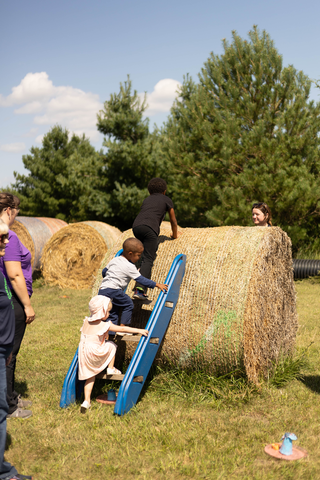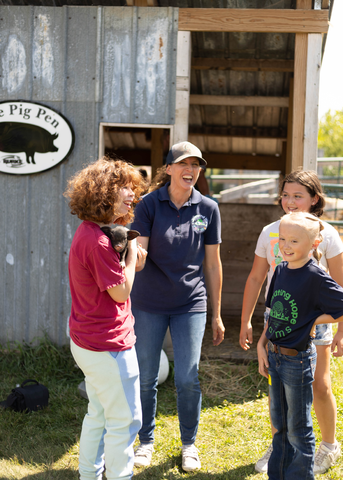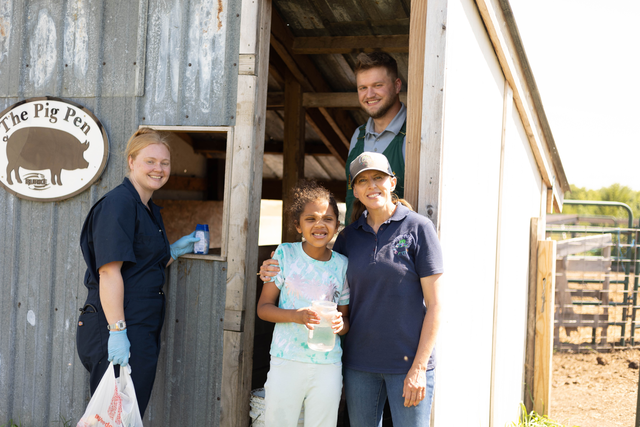Community of Hope
August 4, 2023
By Haley Banwart
Imagine a world where sounds are thunderous, lights are glaring and certain smells, textures and tastes are overwhelming. When sensory overload meets difficulty communicating, fear and anxiety often follow.
How individuals with autism experience their surroundings can be far more intense than how neurotypical people experience them, resulting in behaviors or reactions that are often misunderstood.
Seeking therapy as a person on the spectrum can be equally challenging. Traditional treatment models don’t always consider their needs and how they process their inner and outer worlds.
That’s where unique learning environments like Cultivating Hope Farms offer an alternative avenue for intervention. As the state's first program of its kind, Cultivating Hope Farms aims to grow and support the health and well-being of people with autism through care farming practices.
Family-Centered Approach
Care farming is the therapeutic use of farming practices to provide a safe, natural and positive teaching environment for marginalized or vulnerable groups of people.
Supervised care farming programs include agriculture-related activities, such as plant cultivation or animal husbandry, to provide opportunities for meaningful occupations, mastery of skills, leisure, social growth and more.

For Brad and Gina Perkins, this nontraditional framework was life-changing for their family when their eight-year-old daughter Caitlin was diagnosed with autism in August 2018.
“We’re blessed to own an acreage in rural Boone County. For Caitlin, outdoor interaction with our farm animals was hugely impactful to her progress when we began pursuing therapy at home,” Gina shares. “A variety of clinical therapy options are available, but for Caitlin the home farm environment was more conducive for reaching her goals.”
For instance, instead of an enclosed room where panic and anxiety would set in, the farm gave Caitlin the freedom and emotional safety to speak some of her first words. “I’ll never forget the moment when Caitlin turned to me and said, ‘Hi, Mommy,’ for the first time,” says Gina. “It was a magical moment that helped form our vision for Cultivating Hope Farms. The impact was so powerful, we knew this was something we couldn’t keep for ourselves.”
In 2019, the Perkins began turning their vision into a reality by forming a board and filing the paperwork to become a 501 (c)(3) nonprofit organization. By 2021, Cultivating Hope Farms began offering its first programming to participants throughout the state.
“Autism is a lifelong diagnosis that impacts entire families, so it was important to us to create an inclusive, family-centered environment where all participants are welcome and supported, regardless of age or diagnosis,” Gina adds.
Animal Helper Heroes

Today, Cultivating Hope Farms operates as a working farm where those with autism can practice the skills introduced in therapy while learning about agriculture and working toward individualized goals.
All programming is developed by a certified teacher, occupational therapist and board-certified behavior analyst. One of the signature experiences at the farm includes the Chore Buddy program — a one-on-one opportunity for participants to engage with animal helper heroes and learn husbandry practices.
“Through our Chore Buddy program, we work with only two to three families at a time to ensure they have an intimate experience and the support they need,” says Gina. “Participants come out to the farm and do chores with our mentor volunteers while building tools for success through sequencing.”
Sequencing is an important life skill that not only helps with recounting events but anticipating what comes next. At Cultivating Hope Farms, Chore Buddy participants practice this method by understanding the different types of feed and processes for feeding the animals.
“Tasks that seem simple to neurotypical individuals can be momentous to our participants,” Gina explains. “Successful sequencing experiences allow them to gain a sense of control through meaningful engagement, and working with the animals also develops social awareness.”
In therapeutic settings, animals can be a positive stimulus for improving a person’s social, emotional or cognitive functioning. Gina says that of all the animal helper heroes, the turkeys are a crowd favorite thanks to their docile nature and quiet cooing. Other popular barnyard buddies include Leroy the bull, Wheezer the horse and the many farm cats and kittens that call Cultivating Hope Farms home.
The Power of Giving Back
Of course, none of the unique experiences at Cultivating Hope Farms would be possible without the generosity of its volunteers, partners and sponsors.
Thanks to the support of those who have contributed to the care farm’s cause, more than 100 participants and their family members have been given a place of encouragement where they can feel safe to make mistakes along the way.
“We strive to meet families where they are and recognize that many of our participants lead isolated lives or don’t have a voice to advocate for themselves,” says Gina. “That’s why all the meat, eggs and other products raised are donated to local shelters and other underserved individuals. We want participants to experience the power of giving back to their community.”

The values of Cultivating Hope Farms are further reflected through the service and sacrifice of the Perkins family.
Both Brad and Gina are Iowa natives who come from rural backgrounds. Together with their five children, they own, operate and support their family farm through their other venture — Raspberry Hill Bed and Breakfast. Bursting with old-world charm, the lodging and wedding venue opened for business in 2018 and is located on the same 73 acres as the care farm.
The Perkins are hopeful others will come alongside them to expand Cultivating Hope Farms’ resources and impact. They’re currently constructing a barn to be used as a classroom. “Right now, our programming runs May through October due to the Iowa weather, but the barn will allow us to offer experiences year-round,” says Gina. “Additional fundraising for the barn will help us to make the space ADA-compliant and accessible, but we’re always on the lookout for donations of feed, equipment and other materials so we can continue to deliver and build our services, education and awareness.”
Learn more about supporting Iowa’s first care farm at cultivatinghopefarms.org.